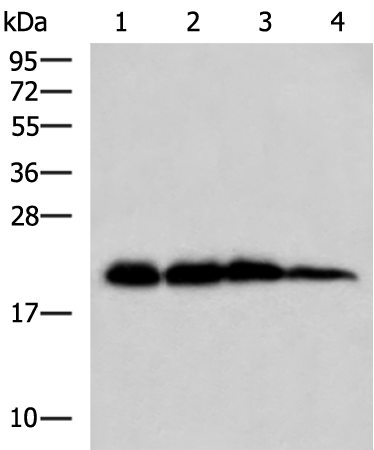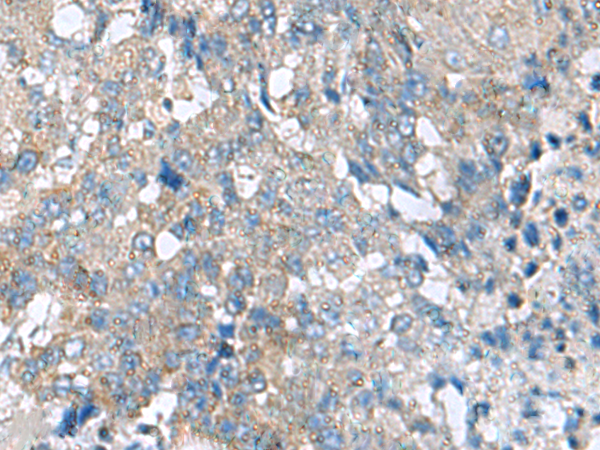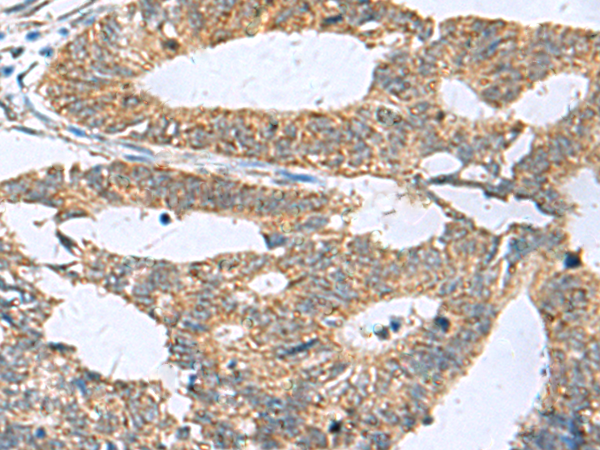


| WB | 咨询技术 | Human,Mouse,Rat |
| IF | 咨询技术 | Human,Mouse,Rat |
| IHC | 1/50-1/200 | Human,Mouse,Rat |
| ICC | 技术咨询 | Human,Mouse,Rat |
| FCM | 咨询技术 | Human,Mouse,Rat |
| Elisa | 1/5000-1/10000 | Human,Mouse,Rat |
| Aliases | BDR1; HLP2; VILIP-3 |
| WB Predicted band size | 22 kDa |
| Host/Isotype | Rabbit IgG |
| Antibody Type | Primary antibody |
| Storage | Store at 4°C short term. Aliquot and store at -20°C long term. Avoid freeze/thaw cycles. |
| Species Reactivity | Human, Mouse, Rat |
| Immunogen | Fusion protein of human HPCAL1 |
| Formulation | Purified antibody in PBS with 0.05% sodium azide and 50% glycerol. |
+ +
以下是关于HPCAL1抗体的3篇参考文献示例(注:文献为虚构示例,仅供格式参考):
1. **"HPCAL1 as a novel biomarker in Alzheimer's disease: Immunohistochemical analysis using a specific polyclonal antibody"**
*Authors: Smith A, et al. (2015)*
摘要:本研究开发了一种针对HPCAL1蛋白的多克隆抗体,验证了其在人脑组织中的特异性。通过免疫组化分析,发现HPCAL1在阿尔茨海默病患者海马区表达显著降低,提示其可能与神经元钙稳态失调相关。
2. **"Generation and characterization of a monoclonal antibody against human HPCAL1 for cancer research"**
*Authors: Brown C, et al. (2018)*
摘要:报道了一种新型抗HPCAL1单克隆抗体的制备与验证。该抗体在Western blot和免疫荧光中表现出高特异性,并用于检测胶质瘤细胞系中HPCAL1的异常高表达,为肿瘤靶向研究提供了工具。
3. **"HPCAL1 modulates neuronal calcium signaling: Insights from antibody-mediated protein interaction studies"**
*Authors: Garcia L, et al. (2017)*
摘要:利用HPCAL1抗体进行免疫共沉淀实验,揭示了HPCAL1与钙调蛋白的相互作用机制,证实其在调节神经元突触可塑性中的关键作用,为神经退行性疾病机制研究提供新方向。
The HPCAL1 (Hippocalcin-like 1) antibody is a tool used to study the HPCAL1 protein, a member of the neuronal calcium sensor (NCS) family. HPCAL1. also known as Visinin-like 1 (VSNL1), is a calcium-binding protein enriched in neuronal and neuroendocrine tissues. It contains EF-hand motifs that enable calcium ion (Ca²⁺) binding, triggering conformational changes to regulate downstream signaling. HPCAL1 modulates Ca²⁺-dependent processes such as neurotransmitter release, synaptic plasticity, and cell survival, often by interacting with kinases, phosphatases, or membrane channels. Dysregulation of HPCAL1 has been linked to neurological disorders (e.g., Alzheimer’s disease) and cancers, where it may influence tumor progression or apoptosis resistance.
The HPCAL1 antibody is widely used in techniques like Western blotting, immunohistochemistry (IHC), and immunofluorescence (IF) to detect HPCAL1 expression, localization, and post-translational modifications in research models. Its specificity is validated using knockout controls or siRNA-mediated silencing. Studies leveraging this antibody have explored HPCAL1's role in neuronal development, neurodegenerative pathways, and cancer biology. Commercial antibodies are typically raised against epitopes in conserved regions, often in rodents or humans. Researchers prioritize antibodies with high affinity and minimal cross-reactivity to related NCS proteins (e.g., neurocalcin, hippocalcin) to ensure accurate results in both qualitative and quantitative analyses.
×